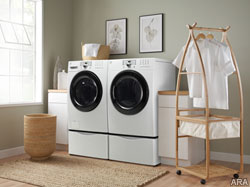
(ARA) – It’s amazing what we can do to our homes today to make them more energy efficient, from green roofs to geothermal heating. While some new homes are built with green in mind, you can also make your existing home more environmentally friendly while also saving some cash.
Whether you are looking to conserve energy or save money, reviewing the EnergyGuide label on appliances and looking for the ENERGY STAR label on appliances, electronics and other energy-using products is a great way to identify the most energy-efficient products on the market. By making a few adjustments in your home energy use, such as choosing ENERGY STAR qualified products, you can save on your utilities bills and make a positive impact on the environment as well.
“From switching your light bulbs to your appliances, there are many ways to reduce your energy consumption,” says Ty Pennington, the host of “Extreme Makeover: Home Edition” and spokesperson for the Sears Big Switch program, which aims to help families make the switch to 5 million ENERGY STAR qualified appliances.
The Big Switch will help educate even more Americans about ENERGY STAR and encourage them to make the switch to more energy-efficient appliances and electronics. You can find out more about the Sears Big Switch initiative, take the ENERGY STAR Pledge, view videos and learn more ways to be green at www.SearsBigSwitch.com.
Here are a few tips from Pennington on how to conserve energy in your home:
* Switch out your incandescent light bulbs for compact florescent light (CFL) bulbs, which use 75 percent less energy and last about 10 times longer than incandescent bulbs. An ENERGY STAR qualified CFL bulb will save about $40 over its lifetime and comes with a two-year warranty. Also, you can use motion-sensor lights in outdoor areas so that you aren’t leaving lights on overnight.
* Consider buying energy-efficient, ENERGY STAR qualified appliances, electronics, heating and cooling equipment and more. In fact, by switching out non-ENERGY STAR appliances that are more than 10 years old for the following ENERGY STAR qualified counterparts – refrigerator, dishwasher, clothes washer, room air conditioner and water heater – you could save more than $2,500 over five years.
* Remove and recycle your old, inefficient appliances. Every year, Americans throw away 9 million refrigerators. Collectively, that’s more than a billion pounds of metal, glass and plastic, as well as more than 18 million pounds of harmful toxins like CFCs, CPBs, mercury and oil. As the first retail member of the U.S. Environmental Protection Agency’s Responsible Appliance Disposal (RAD) program, Sears will remove and recycle inefficient refrigerators and freezers and take them off the energy grid for good. In fact, by removing 5 million inefficient appliances that are at least 10 years old and replacing them with ENERGY STAR qualified models, Americans could see savings that are equivalent to taking more than 600,000 cars off the road.
* Unplug electronics you aren’t using. Many electronics products for your home are consuming energy even when they are not on. Using a power strip can make this easier. If you are considering buying a new electronic, such as a TV, DVD player, computer or any home theater or office product, think about buying ENERGY STAR qualified models. According to the EPA, TVs that carry the ENERGY STAR label are about 40 percent more efficient than conventional models. In fact, if all televisions sold in the United States met the new ENERGY STAR requirements, Americans would save $2.5 billion annually in energy costs while reducing annual greenhouse gas emissions equivalent to the emissions from about 3 million cars.
* Be smart about your home climate. Depending on where you live, replacing your old heating and cooling equipment with equipment that has earned the ENERGY STAR label can cut your annual energy bill by more than $200. Lowering the heat or turning off air conditioners and fans when you are gone can also help keep your energy use down. You can learn more about HVAC equipment by visiting searshomepro.com for additional details.
* Consider conducting an energy audit on your home. During an audit, a professional comes into your home and makes suggestions about things you can do to make your home more efficient. It may be as simple as sealing a few holes, which could end up saving you big bucks in the long run. According to the EPA, in a typical house with forced-air heating and cooling systems, about 20 percent of the air that moves through the duct system is lost due to leaks and poorly sealed connections.
To learn more about the environmentally friendly changes you can make in your home, take the Sears ENERGY STAR Pledge and register for a chance to win a suite of ENERGY STAR qualified appliances, visit SearsBigSwich.com.





